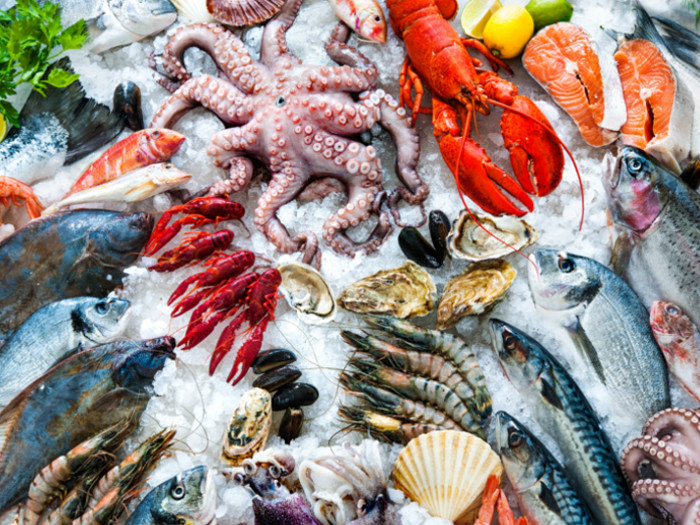People choose to follow a pescatarian diet for health or moral reasons. Whatever may be your motivation behind, it is important to understand the health benefits and potential risks of this diet.
What is a Pescatarian?
A pescatarian, or a pescovegetarian, is defined as a vegetarian who also adds seafood and other fish to their diet, whereas a traditional vegetarian diet eliminates meat products altogether. Some people choose to follow a pescatarian diet because of certain health concerns like high cholesterol levels. [1]
A number of people become a pescatarian due to their concern for the environment, considering the huge impact that livestock production has on the atmosphere and global warming. Finally, there are those who have ethical concerns with the treatment of chickens, cows, and pigs, but less of a problem when it comes to farm-raised fish.

If you are a lover of fish or any type of seafood, then a pescatarian diet is worth a try. Photo Credit: Shutterstock
Pescatarian Health Benefits
There are a number of excellent health benefits to becoming a pescatarian, such as reduced inflammation, improved heart health, and more rapid weight loss, among many others.
Omega-3 Fatty Acids
Seafood is notoriously high in omega-3 fatty acids, which is good news for those who want to boost heart health, as these fats can reduce overall cholesterol levels and lower your risk of heart disease. [2]
Inflammation
Eating more fish and less red meat is also great for inflammation throughout the body, as omega-3 fatty acids also help with joint pain and inflammation, such as for people with arthritis. [3]
Diabetes
The prevalence of type 2 diabetes is rising globally, especially among older adults. According to research in the Journal of Geriatric Cardiology, consumption of a plant-based diet with little meat or fish implied that small amounts of meat contribute majorly to the development of insulin resistance in people with type-2 diabetes. [4]
Cancer
A 2015 study led by Michael J. Orlich, MD, Ph.D., from Loma Linda University, California suggests that along with vegetarians, pescovegetarians have a lower chance of colorectal cancer as compared to non-vegetarians. [5]
Research has found that omega-3 fatty acids are helpful during cancer therapy. A pescatarian diet, being rich in fish, can make for an effective strategy to enhance the clinical outcome of cancer patients. [6]
Cognition
According to Dr. Preston Estep III’s book, The Mindspan Diet, omega-3 fatty acids have also been linked to lowering chronic inflammation in neural pathways and a reduction in plaque deposition, which could help reduce the risk of Alzheimer’s disease. [7]
Mood and Depression
Although the exact chemical pathways aren’t completely clear, studies have found that following a pescatarian diet can help with managing hormonal levels and controlling mood. [8]
Weight Loss
With less cholesterol, fewer calories, and more metabolism-boosting nutrients, a pescatarian diet can definitely help aid in weight loss efforts. [9]
What Do Pescatarians Eat?
Similar to vegetarians, the majority of their diet will consist of the following:
The major difference, as mentioned, is that pescatarians will also eat the following:
Pescatarians don’t eat pork, lamb, wild game, chicken, beef or turkey. Consumption of the above-mentioned foods increase protein intake and thus is found to be beneficial. [10]
Drawbacks to a Pescatarian Diet
While there are many benefits to following this type of diet, there are also some potential drawbacks, specifically when it comes to the risk of heavy metal toxicity, and potential dangers for pregnant women. When eating large amounts of seafood as one of your primary sources of protein, it is important to consider the level of mercury in that seafood. Consuming too much mercury can lead to severe side effects and even death. Avoid eating an excess of seafood that is high in mercury, including shark, swordfish, and king mackerel. [11]
The price of fresh fish is often higher than other sources of protein, so that can also be a prohibitive factor for some people. Ensuring that you get all of your daily nutrients is the biggest challenge when eliminating certain protein and mineral sources from your diet.
